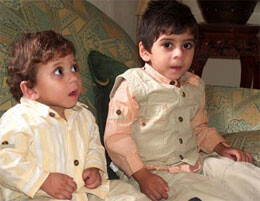B'Tselem 6 December 2007
Ashraf Fathi Hussein al-Shanti, 39, married with four children, is a government clerk and a resident of Gaza City. His testimony was given to Muhammad Sabah at the witness’s home on 17 October 2007:

Muhammad and Mustafa al-Shanti (Muhammad Sabah/B’Tselem.)
In 2000, our first son, Muhammad, was born. Ten days after he was born, we noticed that his skin was yellow, so we took him to al-Shifa’a Hospital, in Gaza, for an examination. The doctors said that we should wait and that the yellow skin color would go away on its own, but that didn’t happen. We took him back for more tests and the doctors said we had to take him to Ramallah for a CT, because there was no place in Gaza to do it.
I requested a permit to go to Ramallah for Muhammad and me, but the Israelis did not grant it. In the end, the doctors at al-Shifa’a operated on his gall bladder, because they thought that was where the problem was. Two weeks later, Muhammad died. We then learned that he had had cystic fibrosis and that the doctors in Gaza had been unable to diagnose it. He died because he did not receive the right treatment. Muhammad’s illness and death were the worst things that ever happened to me.
In 2005, we had another son and we gave him the same name, Muhammad. He too was born with cystic fibrosis, and this time the doctors diagnosed it. At birth, he was kept in an incubator for ten days and was then taken to the children’s hospital in Gaza, where he remained for about two months. The illness affected almost every system in his body.
We searched the Internet for information on treating the disease and found out that Prof. Kerem, from Hadassah Hospital in Jerusalem specialized in cystic fibrosis. I wrote to Hadassah and within 24 hours, they called me on my cell phone and told me to send them Muhammad’s medical records. I sent them immediately and told the hospital that I didn’t have a Palestinian identity card. That same day, somebody from Physicians for Human Rights in Israel called and said they would help Muhammad and my wife get a permit to enter Israel, so that Muhammad could be treated at Hadassah. Officials from the Palestinian Authority’s (PA) liaison office said that the permit was granted in principle, and that we needed to file a request.
I did all the necessary paperwork and submitted the request via the PA’s health coordinator, Ahmad Abu Ghazeh. After waiting about two months, the Israeli side said that my wife and I would not be given a permit because we did not have a Palestinian ID. One of my aunts managed to get a permit and in August 2005, she went with Muhammad to Hadassah and stayed with him for 45 days straight. During that period, I was extremely tense. My wife and daughters cried all the time, worrying about Muhammad. I called my aunt more than six times a day and asked how he was. After having lost my first son, in 2000, I was very worried that I might also lose my second son.
After Muhammad received the treatment, he and my aunt returned to Gaza. The doctors from Hadassah said that he had to return to Hadassah once a month for treatment and follow-up, but my aunt couldn’t continue going with him. In November 2005, after the Red Cross, Physicians for Human Rights, and the Palestinian Health Ministry intervened, the Israelis agreed to give my wife a permit to enter Israel so that she could accompany Muhammad.
In December, the Israelis refused once again to give my wife a permit and there was nobody to accompany Muhammad, so he didn’t get the treatment. In January 2006, my wife managed to get a permit and she went with Muhammad to Hadassah for treatment that lasted three days. Getting a permit each time involved lots of hardship.
In July 2006, my wife gave birth to another son, Mustafa. The doctors in Gaza thought he was born healthy, and it took my wife a year to get a permit to take the two boys for tests in Israel. Then we learned that Mustafa had CF too. The two boys received treatment for one week, and then my wife brought them back to Gaza.
On 13 September 2007, I received a permit to take the children to Hadassah. I took them there for treatment that lasted 21 days. The doctors at Hadassah told us to bring the children back again in October. but now the Israelis are refusing to grant me an entry permit. The children need to receive regular treatment once a month and every delay is harmful. My wife and I are constantly on edge, waiting for the permit to come. Our children’s lives depend on it.
Related Links